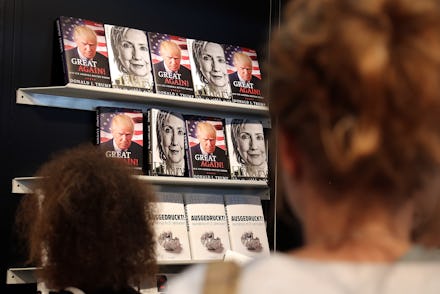Think America was better off in the 1950s? You're probably a Donald Trump supporter.

A majority of Donald Trump supporters think the United States has gone downhill since 1950, while most Hillary Clinton boosters say the country's culture and way of life have improved, a new national study shows.
PRRI's 2016 American Values Survey, released Tuesday, found Trump and Clinton voters near evenly split on how they perceive the nation's trajectory over the last 66 years.
About half of all Americans questioned in the nonpartisan group's study — 51% — said things have changed for the worse since the 1950s, while 48% disagreed.
The differences were far more pronounced when it came to Trump and Clinton supporters, PRRI found. About 72% of those likely to vote for Trump said American culture has devolved since the 1950s. A nearly equal number of likely Clinton supporters, 70%, said things had gotten better.
White evangelical Protestants had the most negative view of how the country has changed over the last six decades: 74% told PRRI they felt the culture had gotten worse since the days of poodle skirts and sock hops.
PRRI CEO Robert Jones said the results show the 2016 election has become "a referendum on competing visions of America's future":
"Donald Trump supporters are nostalgic for the 1950s, an era when white Christians in particular had more political and cultural power in the country, while Hillary Clinton supporters are leaning into — and even celebrating — the big cultural transformations the country has experienced over the last few decades."
Americans aren't just down on cultural changes as they mull who will be the next president: They're skeptical of the voting system itself.
Overall, just 43% of those surveyed by PRRI said they're greatly confident their vote will be counted accurately. Another 38% said they have some confidence and 17% said they had hardly any.
Democrats were likelier than either Republicans or independents to profess faith in the electoral system. Among likely voters, "70% of Clinton supporters but only 41% of Trump supporters" expressed strong faith in the integrity of the system.
As to potential failures, "Roughly two-thirds (66%) of Republicans believe voter fraud is a bigger problem than voter disenfranchisement, while a similar number of Democrats (62%) say eligible voters being denied access is the bigger problem," PRRI found.
In a year when the Democratic Party standard is carried by a woman for the first time, "Democrats are more than twice as likely as Republicans to say the U.S. would benefit from more female leadership," the survey said.
And in a cycle where charges of corruption and malfeasance are commonplace, "Nearly half the public (46%), including 55% of Republicans but only 42% of Democrats, believe the country needs a leader who is willing to break some rules in order to set things right," PRRI said.
Americans aren't wild about either the political party system or its 2016 nominees, the survey showed.
In 1990, 48% of the public said neither major party represented their views. That shot up to 61% in the new study. And neither the Democrat nor the Republican reached 50% favorability: Clinton came in at 41% and Trump trailed at 33%.
"While Americans are almost evenly divided on who is more honest and who is a stronger and more decisive leader," PRRI reported, "Clinton fares significantly better than Trump on attributes such as having the right temperament and personality, having the right background and experience or using military power responsibly."
The divisions don't end there.
Polarization continues along race, ethnic and socio-economic lines. A full 75% of blacks and 56% of Hispanics "report having no close friend or family member who is supporting Trump," versus 24% of whites who said the same. Nearly half of working-class whites said no one close to them is backing Clinton.
On the issues, Americans put terrorism at the top of the list, with "83% of Republicans and 65% of Democrats saying it is a critical issue to them personally."
About half said free-trade agreements drive down U.S. wages and 43% said they make goods more affordable.
On another hot-button issue, criminal justice, 52% of Americans polled "agree police officers generally treat nonwhite and white Americans the same." That's up 15% from 2015.
Here, again, the racial divides are stark:
Roughly 8 in 10 (79%) black Americans and more than 6 in 10 (62%) Hispanic Americans reject the idea that police officers treat everyone the same. In stark contrast, nearly two-thirds (64%) of white Americans, including strong majorities of white working-class (66%) and white college-educated Americans (59%), agree police officers are generally evenhanded in their treatment of nonwhite and white Americans.
Opposition to building a wall on the U.S.-Mexico border, a signature Trump proposal, stood at 58%, but Republicans were three time as likely as Democrats to support the idea.
PRRI surveyed 2,010 adults from Sept. 1 to Sept. 27 with an error margin of plus or minus 2.8 percentage points.